Home · Book Reports · 2016 · The Grand Chessboard - American Primacy and Its Geostrategic Imperatives

- Author :: Zbigniew Brzezinski
- Publication Year :: 1997
- Read Date :: 2016-11-19
- Source :: Grand_Chessboard_-_American_Primacy_and_Its_Geostrategic_Imperatives_(1997).pdf
designates my notes. / designates important.
Thougths
A look into the mind of how the power-brokering elite see the world, as a game. People, institution, and even nations are nothing more than pawns in their quest for empire and domination.
Couched the in predestination of the USA being the first and last global super-power that will exist before the emergence of a global governance. This global governance will be directed, as it emerges, by the USA. Anyone that doesn’t accept the dominance and leadership of the USA is simply “backward” or “anarchists”.
When Russia schemes to regain its former geographic footprint the author attacks on the ground that Russia needs to accept the new reality, but then turns around and talks openly about the exploitation of the Caspian Sea’s natural resource treasures. Similarly if China shows any ambition to be anything more than a region leader, it is painted negatively. Meanwhile, the whole book is essentially a guide to world domination.
On the other hand, as long as Russia and China essentially do as their told in terms of “modernizing”, there will be peace and stability. It reminds of of the Old Testament - kill everyone and call it peace.
In short, it seems like a 1990’s version of divide and conquer politics. By keeping the Chinese, Japanese, Russians, or anyone else that may useful negotiating on the USA’s terms, each nation can be kept off balance of their true national interests. Alongside the 1970’s DoD MindWar concept that populations can be easier won with words than conquered with force, this blueprint seems more akin to building a global governance for and of the oligarchy rather than of anything as silly as nations or people.
Chapter 1 - Hegemony of a New Type:
page 7:

page 8:
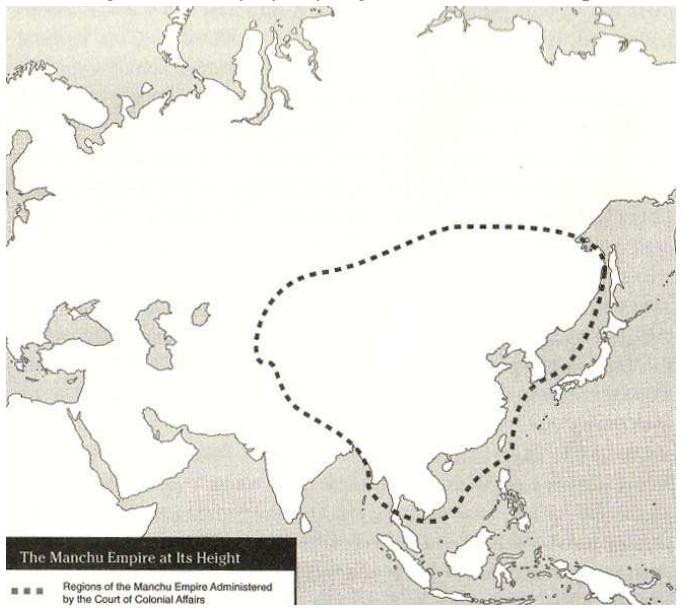
page 10:
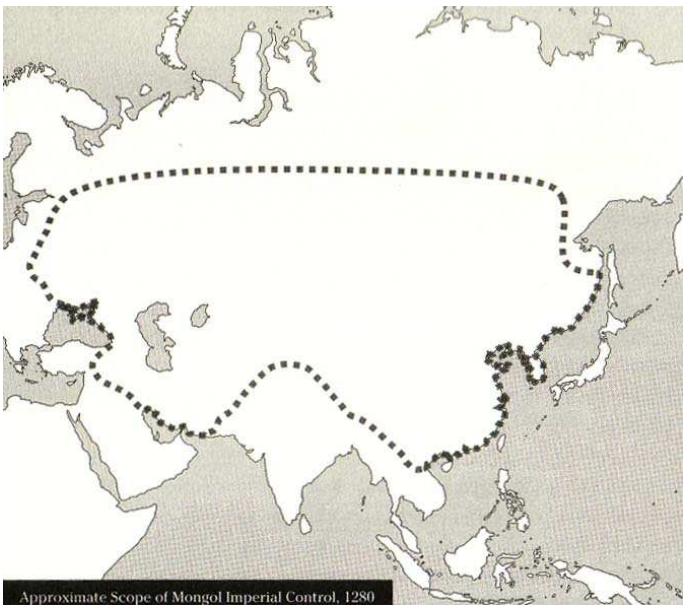
page 11:
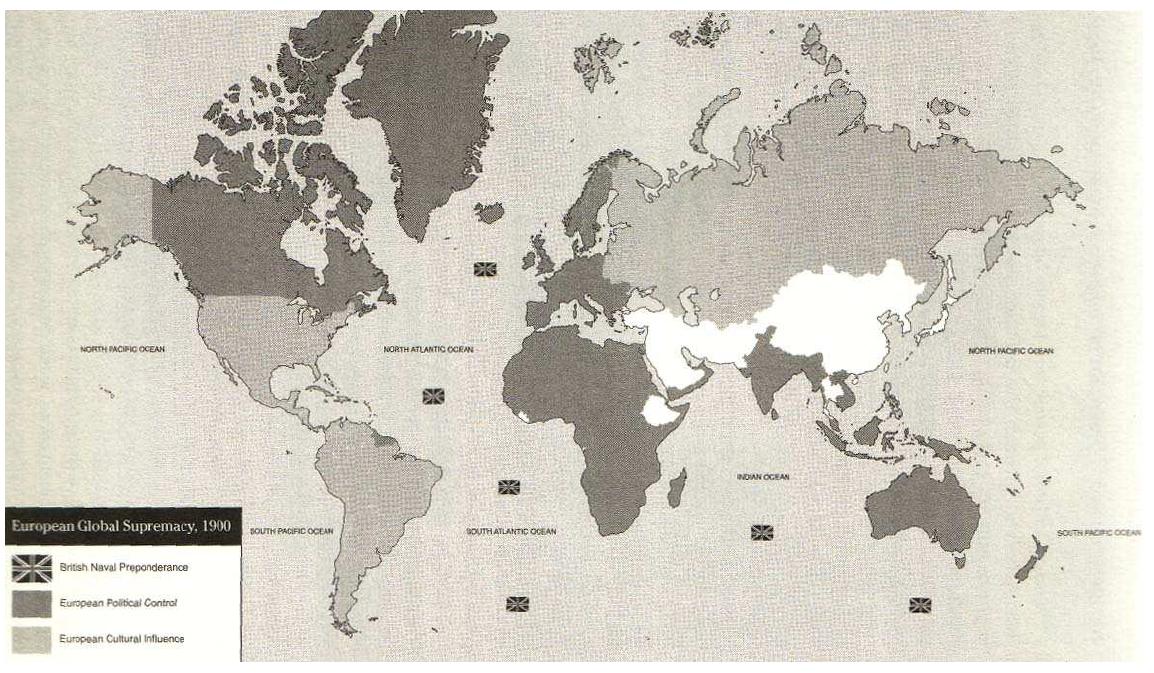
page 12:
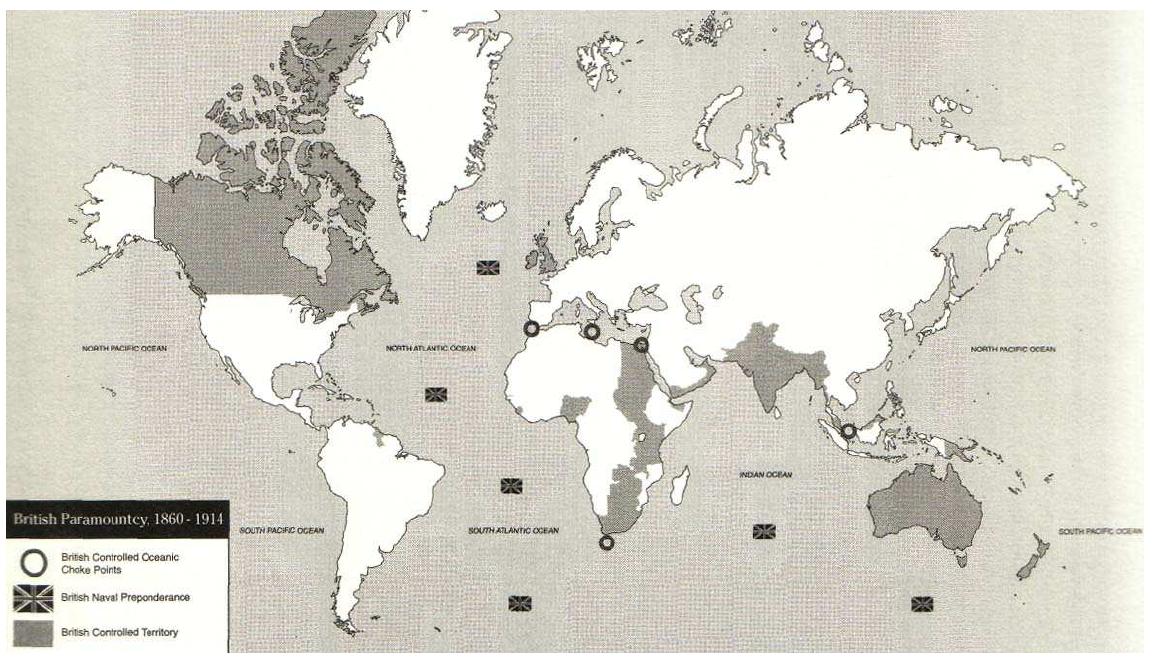
-
In brief, Rome exercised its sway largely through superior military organization and cultural appeal. China relied heavily on an efficient bureaucracy to rule an empire based on shared ethnic identity, reinforcing its control through a highly developed sense of cultural superiority. The Mongol Empire combined advanced military tactics for conquest with an inclination toward assimilation as the basis for rule. The British (as well as the Spanish, Dutch, and French) gained preeminence as their flag followed their trade, their control likewise reinforced by superior military organization and cultural assertiveness. But none of these empires were truly global. Even Great Britain was not a truly global power. It did not control Europe but only balanced it. A stable Europe was crucial to British international preeminence, and Europe’s self-destruction inevitably marked the end of British primacy.
-
America’s economic dynamism provides the necessary precondition for the exercise of global primacy. Initially, immediately after World War II, America’s economy stood apart from all others, accounting alone for more than 50 percent of the world’s GNP. The economic recovery of Western Europe and Japan, followed by the wider phenomenon of Asia’s economic dynamism, meant that the American share of global GNP eventually had to shrink from the disproportionately high levels of the immediate postwar era. Nonetheless, by the time the subsequent Cold War had ended, America’s share of global GNP, and more specifically its share of the world’s manufacturing output, had stabilized at about 30 percent, a level that had been the norm for most of this century, apart from those exceptional years immediately after World War II.
-
American mastery in the cutting-edge sectors of tomorrow’s economy suggests that American technological domination is not likely to be undone soon, especially given that in the economically decisive fields, Americans are maintaining or even widening their advantage in productivity over their Western European and Japanese rivals.
-
In brief, America stands supreme in the four decisive domains of global power, militarily, it has an unmatched global reach; economically, it remains the main locomotive of global growth, even if challenged in some aspects by Japan and Germany (neither of which enjoys the other attributes of global might); technologically, it retains the overall lead in the cutting-edge areas of innovation; and culturally, despite some crassness, it enjoys an appeal that is unrivaled, especially among the world’s youth—all of which gives the United States a political clout that no other state comes close to matching. It is the combination of all four that makes America the only comprehensive global superpower.
page 13:

page 14:
-
The quest for national glory, “the white man’s burden,” “la mission civilisatrice,” not to speak of the opportunities for personal profit—all served to mobilize support for imperial adventures and to sustain essentially hierarchical imperial power pyramids.
-
…the American global system emphasizes the technique of co-optation (as in the case of defeated rivals—Germany, Japan, and lately even Russia) to a much greater extent than the earlier imperial systems did. It likewise relies heavily on the indirect exercise of influence on dependent foreign elites…
-
…reinforced by the massive but intangible impact of the American domination of global communications, popular entertainment, and mass culture and by the potentially very tangible clout of America’s technological edge and global military reach.
-
Cultural domination has been an underappreciated facet of American global power. Whatever one may think of its aesthetic values, America’s mass culture exercises a magnetic appeal, especially on the world’s youth. Its attraction may be derived from the hedonistic quality of the lifestyle it projects, but its global appeal is undeniable. American television programs and films account for about three-fourths of the global market. American popular music is equally dominant, while American fads, eating habits, and even clothing are increasingly imitated worldwide. The language of the Internet is English, and an overwhelming proportion of the global computer chatter also originates from America, influencing the content of global conversation. Lastly, America has become a Mecca for those seeking advanced education, with approximately half a million foreign students flocking to the United States, with many of the ablest never returning home. Graduates from American universities are to be found in almost every Cabinet on every continent.
page 15:
-
As the imitation of American ways gradually pervades the world, it creates a more congenial setting for the exercise of the indirect and seemingly consensual American hegemony. And as in the case of the domestic American system, that hegemony involves a complex structure of interlocking institutions and procedures, designed to generate consensus and obscure asymmetries in power and influence.
-
Unlike earlier empires, this vast and complex global system is not a hierarchical pyramid. Rather, America stands at the center of an interlocking universe, one in which power is exercised through continuous bargaining, dialogue, diffusion, and quest for formal consensus, even though that power originates ultimately from a single source, namely, Washington, D.C.
-
foreign entities lobby in the US
Chapter 2 - The Eurasian Chessboard:
page 17:

-
America’s global primacy is directly dependent on how long and how effectively its preponderance on the Eurasian continent is sustained
-
Obviously, that condition is temporary. But its duration, and what follows it, is of critical importance not only to America’s well-being but more generally to international peace. The sudden emergence of the first and only global power has created a situation in which an equally quick end to its supremacy—either because of America’s withdrawal from the world or because of the sudden emergence of a successful rival—would produce massive international instability. In effect, it would prompt global anarchy. The Harvard political scientist Samuel P. Huntington is right in boldly asserting:
-
A world without U.S. primacy will be a world with more violence and disorder and less democracy and economic growth than a world where the United States continues to have more influence than any other country in shaping global affairs. The sustained international primacy of the United States is central to the welfare and security of Americans and to the future of freedom, democracy, open economies, and international order in the world.1
-
- Samuel P. Huntington. “Why International Primacy Matters,” International Security (Spring 1993):83.
-
anarchy != violence and disorder… anarchy == no rulers
-
A mere glance at the map also suggests that control over Eurasia would almost automatically entail Africa’s subordination
page 19:
- This huge, oddly shaped Eurasian chessboard—extending from Lisbon to Vladivostok—provides the setting for “the game.” If the middle space can be drawn increasingly into the expanding orbit of the West (where America preponderates), if the southern region is not subjected to domination by a single player, and if the East is not unified in a manner that prompts the expulsion of America from its offshore bases, America can then be said to prevail. But if the middle space rebuffs the West, becomes an assertive single entity, and either gains control over the South or forms an alliance with the major Eastern actor, then America’s primacy in Eurasia shrinks dramatically. The same would be the case if the two major Eastern players were somehow to unite. Finally, any ejection of America by its Western partners from its perch on the western periphery would automatically spell the end of America’s participation in the game on the Eurasian chessboard, even though that would probably also mean the eventual subordination of the western extremity to a revived player occupying the middle space.
page 20:
- Empires were also built through the careful seizure and retention of vital geographic assets, such as Gibraltar or the Suez Canal or Singapore, which served as key choke points or linchpins in a system of imperial control.
page 21:
-
Economic prowess, and its translation into technological innovation, can also be a key criterion of power. Japan provides the supreme example
-
Harold Mackinder, pioneered the discussion early in this century with his successive concepts of the Eurasian “pivot area” (which was said to include all of Siberia and much of Central Asia) and, later, of the Central-East European “heartland” as the vital springboards for the attainment of continental domination. He popularized his heartland concept by the famous dictum:
-
Who rules East Europe commands the Heartland;
-
Who rules the Heartland commands the World-Island;
-
Who rules the World-Island commands the world.
page 22:
-
In brief, for the United States, Eurasian geostrategy involves the purposeful management of geostrategically dynamic states and the careful handling of geopolitically catalytic states, in keeping with the twin interests of America in the short-term preservation of its unique global power and in the long-run transformation of it into increasingly institutionalized global cooperation. To put it in a terminology that hearkens back to the more brutal age of ancient empires, the three grand imperatives of imperial geostrategy are to prevent collusion and maintain security dependence among the vassals, to keep tributaries pliant and protected, and to keep the barbarians from coming together.
-
In the current global circumstances, at least five key geostrategic players and five geopolitical pivots (with two of the latter perhaps also partially qualifying as players) can be identified on Eurasia’s new political map. France, Germany, Russia, China, and India are major and active players, whereas Great Britain, Japan, and Indonesia, while admittedly very important countries, do not so qualify. Ukraine, Azerbaijan, South Korea, Turkey, and Iran play the role of critically important geopolitical pivots, though both Turkey and Iran are to some extent—within their more limited capabilities—also geostrategically active.
page 23:
-
Sir Roy Denman, a former British senior official in the European Commission, recalls in his memoirs that as early as the 1955 conference in Messina, which previewed the formation of a European Union, the official spokesman for Britain flatly asserted to the assembled would-be architects of Europe:
-
The future treaty which you are discussing has no chance of being agreed; if it was agreed, it would have no chance of being applied. And if it was applied, it would be totally unacceptable to Britain.. .. au revoir et bonne chance.2
- (2.) Roy Denman, Missed Chances (London: Cassell, 1996).
page 25:
-
Ukraine, a new and important space on the Eurasian chessboard, is a geopolitical pivot because its very existence as an independent country helps to transform Russia. Without Ukraine, Russia ceases to be a Eurasian empire. Russia without Ukraine can still strive for imperial status, but it would then become a predominantly Asian imperial state, more likely to be drawn into debilitating conflicts with aroused Central Asians, who would then be resentful of the loss of their recent independence and would be supported by their fellow Islamic states to the south. China would also be likely to oppose any restoration of Russian domination over Central Asia, given its increasing interest in the newly independent states there. However, if Moscow regains control over Ukraine, with its 52 million people and major resources as well as its access to the Black Sea, Russia automatically again regains the wherewithal to become a powerful imperial state, spanning Europe and Asia. Ukraine’s loss of independence would have immediate consequences for Central Europe, transforming Poland into the geopolitical pivot on the eastern frontier of a united Europe.
-
Despite its limited size and small population, Azerbaijan, with its vast energy resources, is also geopolitically critical. It is the cork in the bottle containing the riches of the Caspian Sea basin and Central Asia.
-
Both Turkey and Iran, however, are primarily important geopolitical pivots. Turkey stabilizes the Black Sea region, controls access from it to the Mediterranean Sea, balances Russia in the Caucasus, still offers an antidote to Muslim fundamentalism, and serves as the southern anchor for NATO. A destabilized Turkey would be likely to unleash more violence in the southern Balkans, while facilitating the reimposition of Russian control over the newly independent states of the Caucasus.
-
Finally, South Korea is a Far Eastern geopolitical pivot. Its close links to the United States enable America to shield Japan and thereby to keep Japan from becoming an independent and major military power, without an overbearing American presence within Japan itself. Any significant change- in South Korea’s status, cither through unification and/or through a shift into an expanding Chinese sphere of influence, would necessarily alter dramatically America’s role in the Far East, thus altering Japan’s as well. In addition, South Korea’s growing economic power also makes it a more important “space” in its own right, control over which becomes increasingly valuable.
-
The above list of geostrategic players and geopolitical pivots is neither permanent nor fixed.
page 27:
- Internal Russian recovery is essential to Russia’s democratization and eventual Europeanization.
page 28:
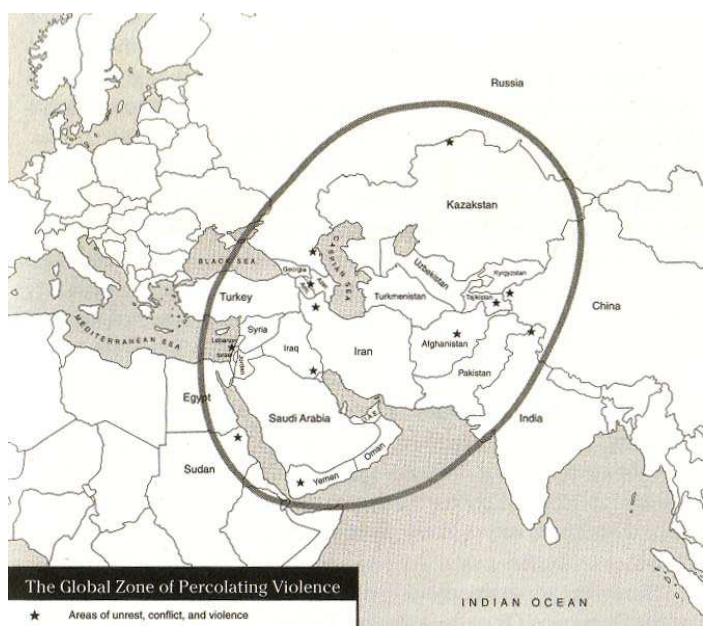
- A possible challenge to American primacy from Islamic fundamentalism could be part of the problem in this unstable region. By exploiting religious hostility to the American way of life and taking advantage of the Arab-Israeli conflict, Islamic fundamentalism could undermine several pro-Western Middle Eastern governments and eventually jeopardize American regional interests, especially in the Persian Gulf. However, without political cohesion and in the absence of a single genuinely powerful Islamic state, a challenge from Islamic fundamentalism would lack a geopolitical core and would thus be more likely to express itself through diffuse violence.
page 29:
-
how large a Chinese sphere of influence, and where, should America be prepared to accept as part of a policy of successfully co-opting China into world affairs? What areas now outside of China’s political radius might have to be conceded to the realm of the reemerging Celestial Empire? In that context, the retention of the American presence in South Korea becomes especially important. Without it, it is difficult to envisage the American-Japanese defense arrangement continuing in its present form, for Japan would have to become militarily more self-sufficient. But any movement toward Korean reunification is likely to disturb the basis for the continued U.S. military presence in South Korea. A reunified Korea may choose not to perpetuate American military protection; that, indeed, could be the price exacted by China for throwing its decisive weight behind the reunification of the peninsula. In brief, U.S. management of its relationship with China will inevitably have direct consequences for the stability of the American-Japanese- Korean triangular security relationship.
-
some ways rivals could emerge against the USA:
-
China-Russia-Iran alliance, based on grievences
-
China-Japan alliance, “farsighted American policy in the Far East should certainly be able to prevent this eventuality from occurring.”
-
German-Russian collusion or a Franco-Russian entente… would require not only a massive mishandling by America of its European policy but also a dramatic reorientation on the part of the key European states.
Chapter 3. The Democratic Bridgehead
page 32:
- On the central issues of the Cold War, France was a loyal, dedicated, and determined ally. It stood shoulder lo shoulder with America when the chips were down. Whether during the two Berlin blockades or during the Cuban missile crisis, there was no doubt about French steadfastness.
page 34:
- A breakdown of Franco-German cooperation would be a fatal setback for Europe and a disaster for America’s position in Europe.
page 34:
- France made remarks about cozying up to Russia to temper American and German influence in the mid 1990s.
page 37:
-
The crisis of political legitimacy and economic vitality that Western Europe increasingly confronts—but is unable to overcome—is deeply rooted in the pervasive expansion of the state- sponsored social structure that favors paternalism, protectionism, and parochialism. The result is a cultural condition that combines escapist hedonism with spiritual emptiness—a condition that can be exploited by nationalist extremists or dogmatic ideologues.
-
isn’t that what the USA does?
-
new problems of Europe—be they immigration or economic-technological competitiveness with America or Asia
page 38:
-
But if the unification and enlargement of Europe should stall, there is some reason to assume that a more nationalist definition of Germany’s concept of the European “order” would then surface, to the potential detriment of European stability. Wolfgang Schauble, the leader of the Christian Democrats in the Bundestag and a possible successor to Chancellor Kohl, expressed that mindset when he stated that Germany is no longer “the western bulwark against the East; we have become the center of Europe,” pointedly adding that in “the long periods during the Middle Ages… Germany was involved in creating order in Europe.” 4
- (4). Politiken Sondag, August 2, 1996
-
Europe would then cease to be the Eurasian bridgehead for American power and the potential springboard for the democratic global system’s expansion into Eurasia. This is why unambiguous and tangible American support for Europe’s unification must be sustained.
page 40:
-
Finally, France is not strong enough either to obstruct America on the geostrategic fundamentals of America’s European policy or to become by itself a leader of Europe as such. Hence, its peculiarities and even its tantrums can be tolerated.
-
Without the French sense of mission, Europe’s southern flank would be much more unstable and threatening. (Tunisia, Morocco)
-
but in the long run, Europe’s construction cannot be based on it [Germany]. Too many memories still linger; too many fears are likely to surface. A Europe constructed and led by Berlin is simply not feasible. That is why Germany needs France, why Europe needs the Franco-German connection, and why America cannot choose between Germany and France.
-
“simply unfeasible”? Get out of here, absolutely feasible, even in the mid 90s.
page 44:
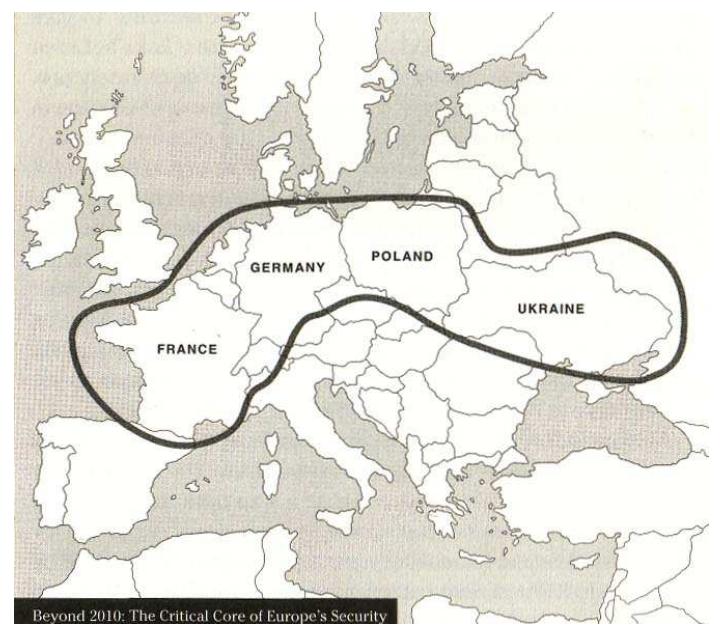
- Somewhere between 2005 and 2010, Ukraine, especially if in the meantime the country has made significant progress in its domestic reforms and has succeeded in becoming more evidently identified as a Central European country, should become ready for serious negotiations with both the EU and NATO.
page 45:
- America’s central geostrategic goal in Europe can be summed up quite simply: it is to consolidate through a more genuine transatlantic partnership the U.S. bridgehead on the Eurasian continent so that an enlarging Europe can become a more viable springboard for projecting into Eurasia the international democratic and cooperative order.
Chapter 4. The Black Hole
page 46:
-
The Sino-Soviet bloc lasted roughly ten years; the Soviet Union about seventy.
-
4 generations, 4 turnings…
page 47:
-
Russia’s international status was significantly degraded, with one of the world’s two superpowers now viewed by many as little more than a Third World regional power,
-
the author has a great vocabulary, except for a few twistings: Third World (countries not aligned with US or USSR in cold war) and anarchy (no rulers). It is almost like he WANTS to twist these words…
-
Its [Russia] economic policies were totally indifferent to ecological concerns, with the result that both the environment and the health of the people suffered greatly.
-
Good thing USA and the rest of the world is so environmentally focused and healthy these days…
-
Hardly a single Russian family has had the opportunity to lead a normal civilized existence.
-
“Normal” aka what the author approves of
page 49:
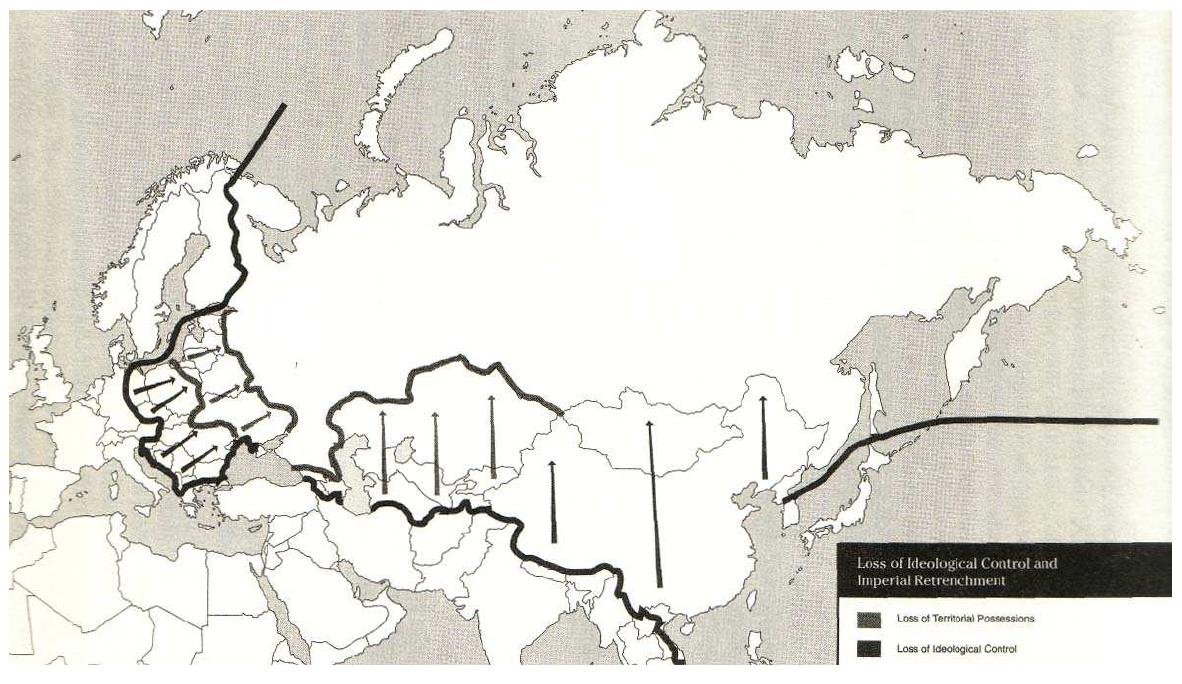
page 52:
-
The new Russia was simply too weak, too devastated by three-quarters of a century of Communist rule, and too socially backward to be a real global partner.
-
socially backward…
-
The moment to have done so cozy up to Russia // was during the second half of 1993, right after Yeltsin’s public endorsement in August of Poland’s interest in joining the transatlantic alliance as being consistent with “the interests of Russia.” Instead, the Clinton administration, then still pursuing its “Russia first” policy, agonized for two more years, while the Kremlin changed its tune and became increasingly hostile to the emerging but indecisive signals of the American intention to widen NATO. By the time Washington decided, in 1996, to make NATO enlargement a central goal in America’s policy of shaping a larger and more secure Euro-Atlantic community, the Russians had locked themselves into rigid opposition. Hence, the year 1993 might be viewed as the year of a missed historic opportunity.
-
Some opponents, to be sure, especially among the Russian military, partook of a Cold War mentality, viewing NATO expansion not as an integral part of Europe’s own growth but rather as the advance toward Russia of an American-led and still hostile alliance.
page 53:
- Even while warning that a “confrontation with the United States … is an option that should be avoided,” senior Russian analysts of American foreign policy argued (not altogether incorrectly) that the United States was seeking “the reorganization of interstate relations in the whole of Eurasia … whereby there was not one sole leading power on the continent but many medium, relatively stable, and moderately strong ones … but necessarily inferior to the United States in their individual or even collective capabilities.“4 4. A. Bogaturov and V. Kremenyuk (both senior scholars in the Institute of the United States and Canada), in “The Americans Themselves Will Never Stop,” Nczdi’iaiiiKiyd Guzi’la, June 28, 1996.
page 54:
-
Additionally, there were purely domestic reasons that a “mature strategic partnership” between two “democracies” proved to be illusory. Russia was just too backward and too devastated by Communist rule to be a viable democratic partner of the United States. That central reality could not be obscured by high-sounding rhetoric about partnership.
-
same phrase repeated, almost feels like propaganda.
page 55:
- Izvestiia reported on April 8, 1994, that Russia had succeeded in retaining no fewer than twenty-eight military bases on the soil of the newly independent states—and a line drawn on a map linking the Russian military deployments in Kaliningrad, Moldova, Crimea, Armenia, Tajikistan, and the Kuril Islands would roughly approximate the outer limits of the former Soviet Union, as in the map on page 108.
page 56:

-
September 1995 document also declared that Russian television and radio broadcasting in the near abroad should be guaranteed, the dissemination of Russian press in the region should be supported, and Russia should train national cadres for CIS states. Special attention should be given to restoring Russia’s position as the main educational center on the territory of the post-Soviet space, bearing in mind the need to educate the young generation in CIS states in a spirit of friendly relations with Russia.
-
Russia focused on “near abroad”
page 57:
-
As early as the mid-1920s, this case was articulated persuasively by Prince N. S. Trubetzkoy, a leading exponent of Eurasian-ism, who wrote that Communism was in fact a disguised version of Europeanism in destroying the spiritual foundations and national uniqueness of Russian life, in propagating there the materialist frame of reference that actually governs both Europe and America
-
Our task is to create a completely new culture, our own culture, which will not resemble European civilization . .. when Russia ceases to be a distorted reflection of European civilization … when she becomes once again herself: Russia-Eurasia, the conscious heir to and bearer of the great legacy of Genghis Khan.6 6. «N. S. Trubetzkoy. “The Legacy of Genghis Khan,” Cross Currents 9 (1990):68.
page 58:
- In July 1996, the U.S. secretary of defense declared, “I cannot overestimate the importance of Ukraine as an independent country to the security and stability of all of Europe,” while in September, the German chancellor—notwithstanding his strong support for President Yeltsin—went even further in declaring that “Ukraine’s firm place in Europe can no longer be challenged by anyone … No one will be able any more to dispute Ukraine’s independence and territorial integrity.”
page 59:
-
Despite the rhetoric and the political agitation among the political elite regarding Russia’s special mission in the space of the former empire, the Russian people—partially out of sheer fatigue but also out of pure common sense—showed little enthusiasm for any ambitious program of imperial restoration. They favored open borders, open trade, freedom of movement, and special status for the Russian language, but political integration, especially if it was to involve economic costs or require bloodshed, evoked little enthusiasm.
-
Common sense?
page 60:
-
In early 1996, Yeltsin traveled to Beijing and signed a declaration that explicitly denounced global “hegemonic” tendencies, thereby implying that the two states would align themselves against the United States. In December, the Chinese prime minister, Li Peng, returned the visit, and both sides not only reiterated their opposition to an international system “dominated by one power” but also endorsed the reinforcement of existing alliances. Russian commentators welcomed this development, viewing it as a positive shift in the global correlation of power and as an appropriate response to America’s sponsorship of NATO’s expansion.
-
However, a coalition allying Russia with both China and Iran can develop only if the United States is shortsighted enough to antagonize China and Iran simultaneously. To be sure, that eventuality cannot be excluded,
-
any such coalition would be essentially an alliance of a part of the Third World against the most advanced portions of the First World. None of its members would gain much, and China especially would risk losing its enormous investment inflows.
-
The alignment would eventually condemn all of its participants, whether two or three in number, to prolonged isolation and shared backwardness.
-
more third world word twisting and backwardness.
page 61:
- Russia’s only real geostrategic option—the option that could give Russia a realistic international role and also maximize the opportunity of transforming and socially modernizing itself—is Europe. And not just any Europe, but the transatlantic Europe of the enlarging EU and NATO. Such a Europe is taking shape, as we have seen in chapter 3, and it is also likely to remain linked closely to America. That is the Europe to which Russia will have to relate, if it is to avoid dangerous geopolitical isolation.
page 62:
-
The key pieces
-
it is equally important for the West, especially for America, to pursue policies that perpetuate the dilemma of the one alternative for Russia. The political and economic stabilization of the new post-Soviet states is a major factor in necessitating Russia’s historical self-redefinition. Hence, support for the new post-Soviet states—for geopolitical pluralism in the space of the former Soviet empire—has to be an integral part of a policy designed to induce Russia to exercise unambiguously its European option. Among these states, three are geopolitically especially important: Azerbaijan, Uzbekistan, and Ukraine.
-
An independent Azerbaijan can serve as a corridor for Western access to the energy-rich Caspian Sea basin and Central Asia. Conversely, a subdued Azerbaijan would mean that Central Asia can be sealed off from the outside world and thus rendered politically vulnerable to Russian pressures for reintegration. Uzbekistan, nationally the most vital and the most populous of the Central Asian states, represents a major obstacle to any renewed Russian control over the region. Its independence is critical to the survival of the other Central Asian states, and it is the least vulnerable to Russian pressures.
-
Most important, however, is Ukraine. As the EU and NATO expand, Ukraine will eventually be in the position to choose whether it wishes to be part of either organization. It is likely that, in order to reinforce its separate status, Ukraine will wish to join both, once they border upon it and once its own internal transformation begins to qualify it for membership. Although that will take time, it is not too early for the West—while further enhancing its economic and security ties with Kiev—to begin pointing to the decade 2005- 2015 as a reasonable time frame for the initiation of Ukraine’s progressive inclusion, thereby reducing the risk that the Ukrainians may fear that Europe’s expansion will halt on the Polish-Ukrainian border.
-
Yet if Ukraine is to survive as an independent state, it will have to become part of Central Europe rather than Eurasia, and if it is to be part of Central Europe, then it will have to partake fully of Central Europe’s links to NATO and the European Union.
-
join a group(s) to be independent…
Chapter 5. The Eurasian Balkans
page 64:
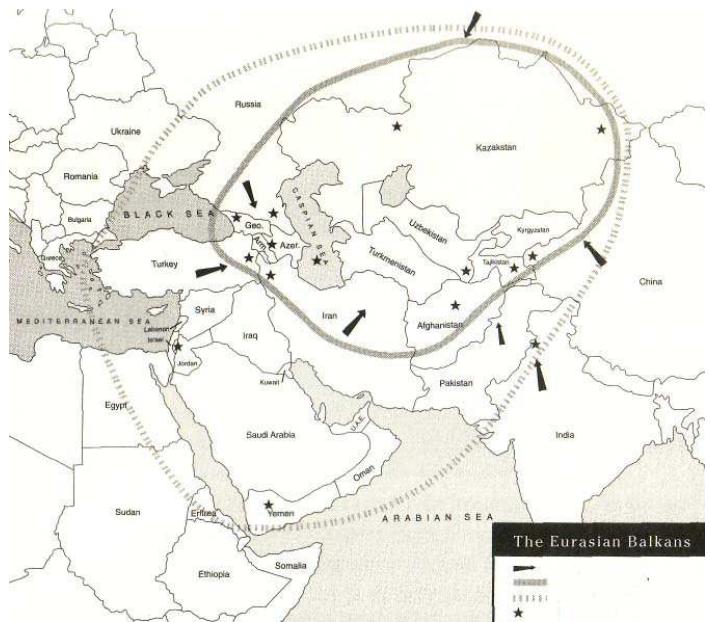
-
the Eurasian Balkans are infinitely more important as a potential economic prize: an enormous concentration of natural gas and oil reserves is located in the region, in addition to important minerals, including gold.
-
gold?
-
Central Asian region and the Caspian Sea basin are known to contain reserves of natural gas and oil that dwarf those of Kuwait, the Gulf of Mexico, or the North Sea.
-
The nine are Kazakstan, Kyrgyzstan, Tajikistan, Uzbekistan, Turkmenistan, Azerbaijan, Armenia, and Georgia—all of them formerly part of the defunct Soviet Union—as well as Afghanistan. The potential additions to the list are Turkey and Iran, both of them much more politically and economically viable, both active contestants for regional influence within the Eurasian Balkans, and thus both significant geostrategic players in the region. At the same time, both are potentially vulnerable to internal ethnic conflicts. If either or both of them were to be destabilized, the internal problems of the region would become unmanageable, while efforts to restrain regional domination by Russia could even become futile.
-
Eurasian Balkans
page 65:

-
The Eurasian Balkans are an ethnic mosaic (see preceding table and map). The frontiers of its states were drawn arbitrarily by Soviet cartographers in the 1920s and 1930s, when the respective Soviet republics were formally established. (Afghanistan, never having been part of the Soviet Union, is the exception.) Their borders were carved out largely on the ethnic principle, but they also reflected the Kremlin’s interest in keeping the southern region of the Russian Empire internally divided and thus more subservient.
-
Balfort (sp?, post ww1 cutting up the middle east) what?
page 66:
-
Armenia’s less than 4 million people and Azerbaijan’s more than 8 million promptly became embroiled in open warfare over the status of Nagorno-Karabakh, a largely Armenian-populated enclave within Azerbaijan. The conflict generated large-scale ethnic cleansings, with hundreds of thousands of refugees and expellees fleeing in both directions. Given the fact that Armenia is Christian and Azerbaijan Muslim, the war has some overtones of a religious conflict. The economically devastating war made it much more difficult for either country to establish itself as stably independent. Armenia was driven to rely more on Russia, which had provided significant military help, while Azerhaijan’s new independence and internal stability were compromised by the loss of Nagorno-Karabakh.
-
Azerbaijan’s vulnerability has wider regional implications because the country’s location makes it a geopolitical pivot. It can be described as the vitally important “cork” controlling access to the “bottle” that contains the riches of the Caspian Sea basin and Central Asia. An independent, Turkic-speaking Azerbaijan, with pipelines running from it to the ethnically related and politically supportive Turkey, would prevent Russia from exercising a monopoly on access to the region and would thus also deprive Russia of decisive political leverage over the policies of the new Central Asian states.
page 67:
- Of the five newly independent Central Asian states, Kazakstan and Uzbekistan are the most important.
page 68:
-
Once pipelines to the area have been developed, Turkmenistan’s truly vast natural gas reserves augur a prosperous future for the country’s people.
-
Most of the countries making up the caucuses are internally divided ethnically. This helps keep them fighting among themselves. Seems about the same as the Balfort(sp?) agreement carving up the middle east after WW1.
-
Afghanistan’s current state of disarray is likewise a Soviet legacy, even though the country is not a former Soviet republic. Fragmented by the Soviet occupation and the prolonged guerrilla warfare conducted against it, Afghanistan is a nation-state in name only.
-
Don’t the underdogs usually do the guerilla war thing, not the empires?
page 69:
-
Iran’s future orientation is even more problematic. The fundamentalist Shiite revolution that triumphed in the late 1970s may be entering its “Thermidorian” phase, and that heightens the uncertainty regarding Iran’s geostrategic role.
-
Thermidorian?
-
Outside of the Kurds and the Azeris, the others at present do not have the capacity to threaten Iran’s national integrity, especially given the high degree of national, even imperial, consciousness among the Persians. But that could change quite quickly, particularly in the event of a new political crisis in Iranian politics.
page 70:
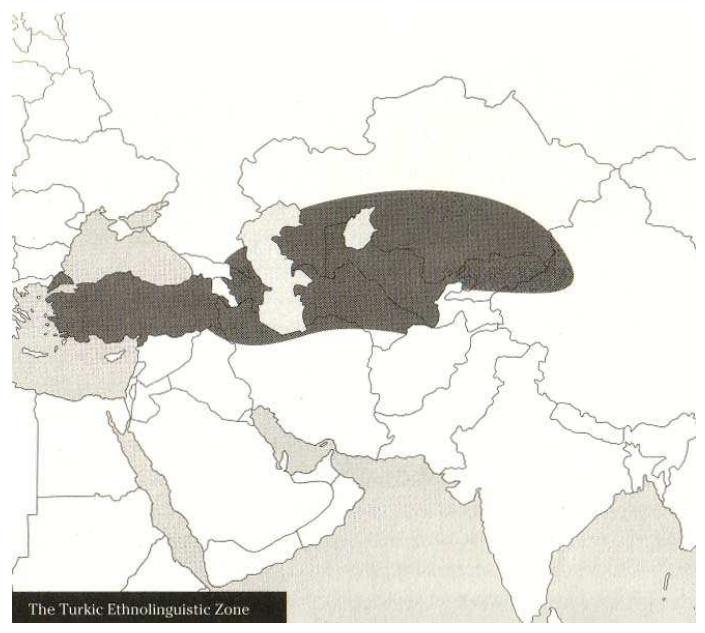
- Each was at one time or another either the politically or the culturally dominant power in the region. Each views the others with suspicion. Although head-on warfare among them is unlikely, the cumulative impact of their external rivalry could contribute to regional chaos.
page 71:

-
Ukraine has supported Georgia’s efforts to become the westward route for Azeri oil exports. Ukraine has also collaborated with Turkey in order to weaken Russian influence in the Black Sea and has supported Turkish efforts to direct oil flows from Central Asia to Turkish terminals.
-
to benefit eventually from any pipeline construction linking Central Asia with the Arabian Sea.
page 72:
- It is this consideration that has made the pipeline issue so central to the future of the Caspian Sea basin and Central Asia. If the main pipelines to the region continue to pass through Russian territory to the Russian outlet on the Black Sea at Novorossiysk, the political consequences of this condition will make themselves felt, even without any overt Russian power plays. The region will remain a political dependency, with Moscow in a strong position to determine how the region’s new wealth is to be shared. Conversely, if another pipeline crosses the Caspian Sea to Azerbaijan and thence to the Mediterranean through Turkey and if one more goes to the Arabian Sea through Afghanistan, no single power will have monopoly over access.
page 73:
- For Russia, Azerbaijan has to be a priority target. Its subordination would help to seal off Central Asia from the West, especially from Turkey, thereby further increasing Russia’s leverage vis-a-vis the recalcitrant Uzbekistan and Turkmenistan.
page 74:
- In 1995, amid much fanfare, a new rail link between Turkmenistan and Iran was opened, making it feasible for Europe to trade with Central Asia by rail, skirting Russia altogether. There was a touch of symbolic drama to this reopening of the ancient Silk Route, with Russia thus no longer able to separate Europe from Asia.
page 75:

page 76:
-
It follows that America’s primary interest is to help ensure that no single power comes to control this geopolitical space and that the global community has unhindered financial and economic access to it.
-
However, the exclusion of Russia from the area is neither desirable nor feasible, nor is the fanning of hostility between the area’s new states and Russia. In fact, Russia’s active economic participation in the region’s development is essential to the area’s stability—and having Russia as a partner, but not as an exclusive dominator, can also reap significant economic benefits as a result.
-
The states deserving America’s strongest geopolitical support are Azerbaijan, Uzbekistan, and (outside this region) Ukraine, all three being geopolitically pivotal. Indeed, Kiev’s role reinforces the argument that Ukraine is the critical state, insofar as Russia’s own future evolution is concerned.
Chapter 6. The Far Eastern Anchor
page 78:
-
For China, America across the Pacific should be a natural ally since America has no designs on the Asian mainland
-
[America] is now closely allied with Japan. America also has strong ties with Taiwan and with several of the Southeast Asian nations.
-
So USA does have designs?
page 82:
-
China’s rapid growth is widening the social gap in the distribution of wealth.
-
the regional disparities and the wealth gap could in turn impact on the country’s political stability.
page 83:
-
The Chinese political elite remains organized as a self-contained, rigid, disciplined, and monopolisti-cally intolerant hierarchy,…
-
Really? I’d say the love being the monopoly
-
To accomplish such controlled democratization, the Chinese political elite will have to be led with extraordinary skill, guided by pragmatic common sense, and stay relatively united and willing to yield some of its monopoly on power (and personal privilege)— while the population at largo will have to be both patient and undemanding.
-
And the USA will lead them right?
-
Yield monopoly? I thought they didn’t like monopolies…
page 85:

-
if China were to control the Strait of Malacca and the geostrategic choke point at Singapore, it would control Japan’s access to Middle Eastern oil and European markets.
-
the rapidly growing demand for new energy sources has already made China insistent on a dominant role in any regional exploitation of the seabed deposits of the South China Sea.
page 86:
-
- According to Yazhou Zhoukan (Asiaweek), September 25, 1994, the aggregate assets of the 500 leading Chinese-owned companies in Southeast Asia totaled about $540 billion. Other estimates are even higher: International Economy,. November/December 1996, reported that the annual in-c’ome of the 50 million overseas Chinese was approximately the above amount and thus roughly equal to the GDP of, China’s mainland. The overseas Chinese were said to control about 90 percent of Indonesia’s economy, 75 percent of Thailand’s, 50-60 percent of Malaysia’s, and the whole economy in Taiwan, Hong Kong, and Singapore. Concern over this condition even led a former Indonesian ambassador to Japan to warn publicly of a “Chinese economic intervention in the region,” which might not only exploit such Chinese presence but which could even lead to Chinese-sponsored “puppet governments” (Saydiman Suryohadiprojo, “How to Deal with China and Taiwan,” AsahiShimbun [Tokyo], September 23, 1996).
page 87:
-
Chinese analyst employed in the research arm of the Chinese Foreign Ministry: “The U.S. strategic aim is to seek hegemony in the whole world and it cannot tolerate the appearance of any big power on the European and Asian continents that will constitute a threat to its leading position.“5 Hence, simply by being what it is and where it is, America becomes China’s unintentional adversary rather than its natural ally.
-
We are the empire, “just the way it is”.
-
- Song Yimin. “A Discussion of the Division and Grouping of Forces in the World After the End of the Cold War,” International Studies (China Institute of International Studies, Beijing) 6-8 (1996):10. That this assessment of America represents the view of China’s top leadership is indicated by the fact that a shorter version of the analysis appeared in the mass-circulation official organ of the Party, Renmin Ribao (People’s Daily), April 29, 1996.
page 89:
-
There is a superficial similarity between Japan’s situation in Eurasia’s Far East and Germany’s in Eurasia’s Far West. Both are the principal regional allies of the United States. Indeed, American power in Europe and Asia is derived directly from the close alliances with these two countries. Both have respectable military establishments, but neither is independent in that regard: Germany is constrained by its military integration into NATO, while Japan is restricted by its own (though American-designed) constitutional limitations and the U.S.- Japan Security Treaty. Both are trade and financial powerhouses, regionally dominant and also preeminent on the global scale. Both can be classified as quasi-global powers, and both chafe at the continuing denial to them of formal recognition through permanent seats on the UN Security Council.
-
Japan is politically isolated in its region, whereas Germany is not.
page 94:

-
the link with America remains Japan’s central lifeline. Without it, Japan can neither ensure itself a steady supply of oil nor protect itself from a Chinese (and perhaps soon, also a Korean) nuclear bomb.
-
North Korea is about to get nukes!
-
Shedding past fixation on the threat allegedly posed by Japan’s economic ascension and eschewing fears of Chinese political muscle could help to infuse cool realism into a policy that must be based on careful strategic calculus: how to channel Japanese energy in the international direction and how to steer Chinese power into a regional accommodation.
page 95:
- An “antihegemonic” coalition could become a last-resort option if China came to feel that its national or regional aspirations were being blocked by the United States (with Japan’s support). But it would be a coalition of the poor, who would then be likely lo remain collectively poor for quite sonic time.
page 97:
- These considerations thus enhance the American and Japanese stakes in the Korean status quo (though in each case, for somewhat different reasons), and if that status quo is to be altered, it must occur in very slow stages, preferably in a setting of a deepening American-Chinese regional accommodation.
Chapter 7. Conclusion
-
Short of a deliberate or unintentional American abdication, the only real alternative to American global leadership in the foreseeable future is international anarchy.
-
If we aren’t in charge no one can be.
-
The resulting risks to global stability are likely to be further increased by the prospect of a more general degradation of the human condition. Particularly in the poorer countries of the world, the demographic explosion and the simultaneous urbanization of these populations are rapidly generating a congestion not only of the disadvantaged but especially of the hundreds of millions of unemployed and increasingly restless young, whose level of frustration is growing at an exponential rate. Modern communications intensify their rupture with traditional authority, while making them increasingly conscious—and resentful—of global inequality and thus more susceptible to extremist mobilization. On the one hand, the rising phenomenon of global migrations, already reaching into the tens of millions, may act as a temporary safety valve, but on the other hand, it is also likely to serve as a vehicle for the transcontinental conveyance of ethnic and social conflicts.
page 101:
- A Transatlantic Free Trade Agreement, already advocated by a number of prominent Atlantic leaders, could also mitigate the risk of growing economic rivalry between a more united EU and the United States.
page 103:
-
a more decentralized Russia would be less susceptible to imperial mobilization. A loosely confederated Russia—composed of a European Russia, a Siberian Republic, and a Far Eastern Republic—would also find it easier to cultivate closer economic relations with Europe, with the new states of Central Asia, and with the Orient, which would thereby accelerate Russia’s own development. Each of the three confederated entities would also be more able to tap local creative potential, stifled for centuries by Moscow’s heavy bureaucratic hand.
-
It would be great if Russia was broken up, it would be better (for USA).
page 105:
-
it would make sense to coopt China into the G-7 annual summit of the world’s leading countries, especially since Russia’s inclusion has widened the summit’s focus from economics to politics.
-
Thus for America, China’s regional power, co-opted into a wider framework of international cooperation, can be a vitally important geostrategic asset—in that regard coequally important with Europe and more weighty than Japan—in assuring Eurasia’s stability.
-
A1though Japan cannot become a dominant Asian regional power, given the strong regional aversion it evokes, it can become a leading international one. Tokyo can carve out a globally influential role by cooperating closely with the United States regarding what might be called the new agenda of global concerns, …
-
the new agenda of global concerns
-
It is through a close political relationship with Japan that America will more safely be able to accommodate China’s regional aspirations, while opposing its more arbitrary manifestations. Only on that basis can an intricate three-way accommodation—one that involves America’s global power, China’s regional preeminence, and Japan’s international leadership—be contrived.
page 106:
- But to get there, NATO must first expand, while engaging Russia in a larger regional framework of security cooperation.
page 107:
-
Democratization is inimical to imperial mobilization.
-
Moreover, as America becomes an increasingly multicultural society, it may find it more difficult to fashion a consensus on foreign policy issues, except in the circumstances of a truly massive and widely perceived direct external threat. Such a consensus generally existed throughout World War II and even during the Cold War.
-
on the one hand, the view that the end of the Cold War justifies a significant reduction in America’s global engagement, irrespective of the consequences for America’s global standing; and on the other, the perception that the time has come for genuine international multilateralism, to which America should even yield some of its sovereignty.
-
So either reduce global engagement or give up soverignity?
-
More generally, cultural change in America may also be uncongenial to the sustained exercise abroad of genuinely imperial power. That exercise requires a high degree of doctrinal motivation, intellectual commitment, and patriotic gratification. Yet the dominant culture of the country has become increasingly fixated on mass entertainment that has been heavily dominated by personally hedonistic and socially escapist themes. The cumulative effect has made it increasingly difficult to mobilize the needed political consensus on behalf of sustained, and also occasionally costly, American leadership abroad. Mass communications have been playing a particularly important role in that regard, generating a strong revulsion against any selective use of force that entails even low levels of casualties.
-
Mass communications, playing down their biggest weapon to shape the culture. Is he clueless or lying?
-
The resulting cultural crisis has been compounded by the spread of drugs and, especially in America, by its linkage to the racial issue. Lastly, the rate of economic growth is no longer able to keep up with growing material expectations, with the latter stimulated by a culture that places a premium on consumption.
-
The racial issue the mass communications are pushing?
page 108:
-
widespread disappointment with the consequences of the end of the Cold War. Instead of a “new world order” based on consensus and harmony, “things which seemed to belong to the past” have all of a sudden become the future.
-
war is not likely to become obsolete for some time to come. With the more-endowed nations constrained by their own higher technological capacity for self-destruction as well as by self-interest, war may have become a luxury that only the poor peoples of this world can afford. In the foreseeable future, the impoverished two-thirds of humanity may not be motivated by the restraint of the privileged.
page 109:
-
In brief, the U.S. policy goal must be unapologetically twofold: to perpetuate America’s own dominant position for at least a generation and preferably longer still; and to create a geopolitical framework that can absorb the inevitable shocks and strains of social-political change while evolving into the geopolitical core of shared responsibility for peaceful global management.
-
These efforts will have the added historical advantage of benefiting from the new web of global linkages that is growing exponentially outside the more traditional nation-state system. That web—woven by multinational corporations, NGOs (nongovernmental organizations, with many of them transnational in character) and scientific communities and reinforced by the Internet—already creates an informal global system that is inherently congenial to more institutionalized and inclusive global cooperation.